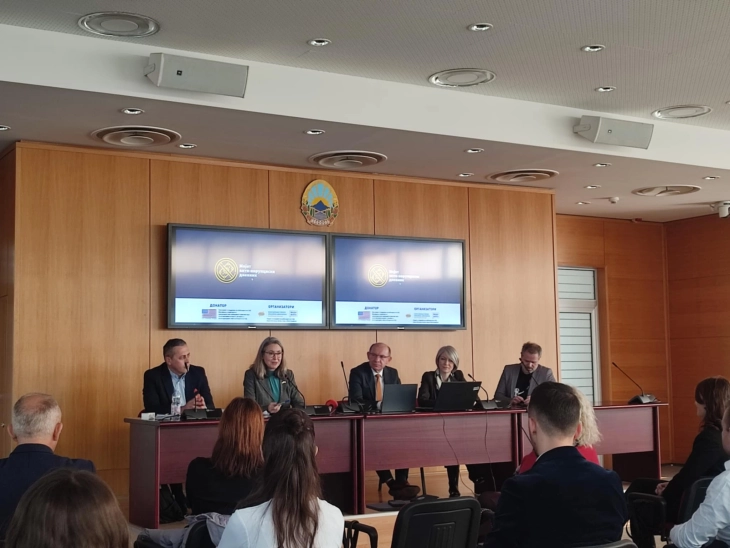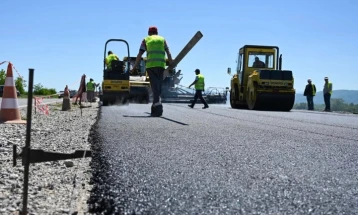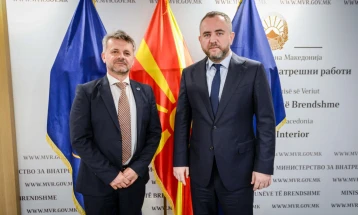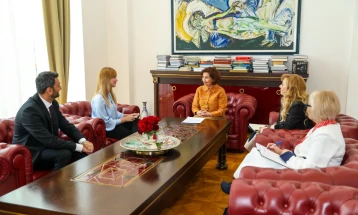"My Anti-Corruption Diary" - a project to empower youth to recognize and resist corruption
- The fight against corruption is a priority and young people should be encouraged to recognize and resist corruption in their everyday lives. This is the main message of the event "My Anti-Corruption Diary" which aims to educate and empower young people and young political leaders about ethical leadership and accountable governance.

Skopje, 26 November 2024 (MIA) - The fight against corruption is a priority and young people should be encouraged to recognize and resist corruption in their everyday lives. This is the main message of the event "My Anti-Corruption Diary" which aims to educate and empower young people and young political leaders about ethical leadership and accountable governance.
In a statement to the media ahead of Tuesday's event, the speakers pointed out that through the project, young people are expected to take initiatives and give proposals towards improving the situation in party structures. The project looks into various mechanisms for reporting corruption and highlights the importance of institutional capacities for an effective fight against corruption. The trainings aim to build a healthier society where the rule of law, justice and fairness will prevail.
Virginia Elliott, head of the U.S. Embassy’s International Narcotics and Law Enforcement Affairs (INL) Section, told reporters she hopes that through this project there will be young people more engaged to advocate for more transparency and accountability from government and throughout everyday life and society.

"My Anti-Corruption Diary is a project to empower youth to recognize and to resist corruption in their everyday lives and to follow it and reflect on how it affects them and people around them," she said.
North Macedonia's Liaison Prosecutor at Eurojust, Lenche Ristoska, noted that the goal of the project is to address corruption from another level, i.e. from the level of those who hold the decisive power in the future.
"We chose young people and young political leaders because we believe that by promoting ethical leadership and a new standard in governance, we will truly be able to face the challenges posed by corruption. We have the impression that so far there has been a lot of talk about corruption, but the results are missing, and therefore we believe that by addressing this problem specifically among young people and by strengthening their capacities to recognize and build resilience to corruption, we will be able to have truly significant results as a society in the fight against corruption," Ristoska said.
As regards the question of how they will encourage young people to report such cases when trust in the judiciary is at an unenviable low level, she said the goal of the project is to consider all mechanisms available to young people.
Ristoska is confident that the knowledge and skills that young political leaders will acquire within this project will be implemented within party structures.
"We believe that this will strengthen the capacity of all political parties in general. We expect young leaders themselves, within the political parties, to take initiatives, to give proposals stemming from the ideas they will acquire within this project, we expect that step by step we will one day have truly significant results," Ristoska pointed out.
According to Judge Betim Jahja, the trainings should help in the fight against corruption, which is has reached endemic proportions in the country.
"The goal is to build a healthier society where the rule of law, justice and fairness will prevail, and corruption will be suppressed as much as possible," said Jahja.
According to Chief Prosecutor Ljupcho Kocevski, the fight against corruption is a top priority, but it is a task of all citizens, not just the Public Prosecutor's Office.
"Tackling corruption requires cooperation with the judiciary, the media and the non-governmental sector. Strengthening the culture against corruption starts from an early age. The Public Prosecutor's Office is taking all necessary steps to effectively fight corruption," said the Chief Prosecutor.
The project "My Anti-Corruption Diary" is supported by the U.S. Embassy and implemented by the IDEA Foundation, in collaboration with U.S. Embassy alumni Lenche Ristoska, Betim Jahja, and Mite Kuzevski.
The project includes three one-day workshops, where participants will weigh their initial and acquired knowledge of anti-corruption and develop skills for recognizing and dealing with corruption.
In addition to the workshops, the project includes keeping an online anti-corruption diary in which participants will record anti-corruption activities that occur in their everyday lives, regardless of whether they have personally experienced or witnessed such actions.
Photo: MIA







